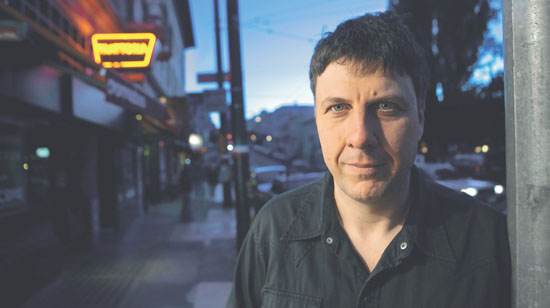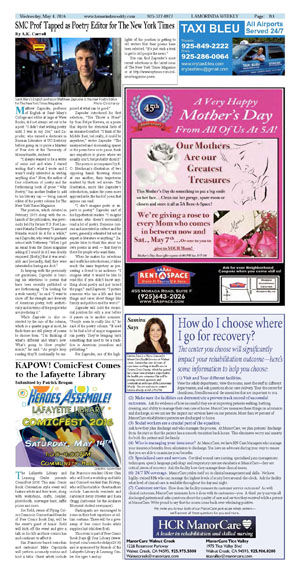|
|
Published May 4th, 2016
|
SMC Prof Tapped as Poetry Editor for The New York Times
|
|
| By A.K. Carroll |
 |
| Saint Mary's English professor Matthew Zapruder is the new Poetry Editor for The New York Times Magazine. Photo Chris Hardy |
Matthew Zapruder, professor of English at Saint Mary's College and editor at large at Wave Books, did not always set out to be a poet. "I didn't start writing poetry until I was in my 20s," said Zapruder, who earned a doctorate in Russian Literature at UC Berkeley before going on to purse a Masters of Fine Arts at the University of Massachusetts, Amherst.
 "I always wanted to be a writer of some sort and when I started writing that's what I wrote and I wasn't really interested in writing anything else." Now, the author of four collections of poetry and the forthcoming book of prose ''Why Poetry,'' has another feather to add to his literary cap - being named editor of the poetry column for The New York Times Magazine.
"I always wanted to be a writer of some sort and when I started writing that's what I wrote and I wasn't really interested in writing anything else." Now, the author of four collections of poetry and the forthcoming book of prose ''Why Poetry,'' has another feather to add to his literary cap - being named editor of the poetry column for The New York Times Magazine.
 The position, which debuted in February 2015 along with the re-launch of the publication, was previously held by former U.S. Poet Laureate Natasha Trethewey. "I assumed Natasha would do it for a while," said Zapruder, who went to graduate school with Trethewey. "When I got an email from the Times magazine asking if I would do it I was doubly surprised: [firstly,] that it was available and [secondly, that] they were interested in having me do it."
The position, which debuted in February 2015 along with the re-launch of the publication, was previously held by former U.S. Poet Laureate Natasha Trethewey. "I assumed Natasha would do it for a while," said Zapruder, who went to graduate school with Trethewey. "When I got an email from the Times magazine asking if I would do it I was doubly surprised: [firstly,] that it was available and [secondly, that] they were interested in having me do it."
 In keeping with the previously set guidelines, Zapruder is limiting his selections to poems that have been recently published or are forthcoming. "I'm looking for a wide variety," he said. "I want to show off the strength and diversity of American poetry, both aesthetically and in terms of the people who are producing it."
In keeping with the previously set guidelines, Zapruder is limiting his selections to poems that have been recently published or are forthcoming. "I'm looking for a wide variety," he said. "I want to show off the strength and diversity of American poetry, both aesthetically and in terms of the people who are producing it."
 While Zapruder is also restricted by the size of the column, which is a quarter page at most, he finds there are still plenty of poems to choose from. "I'm thinking of what's different and what's new. What's going to blow peoples' minds," he said. "As people keep reading they'll continually be surprised at what can be good."
While Zapruder is also restricted by the size of the column, which is a quarter page at most, he finds there are still plenty of poems to choose from. "I'm thinking of what's different and what's new. What's going to blow peoples' minds," he said. "As people keep reading they'll continually be surprised at what can be good."
 Zapruder introduced his first selection, "You Throw a Stone" by Juan Felipe Herrera, as a poem that depicts the elemental facts of an unnamed conflict. "I think of the Middle East, but really, it could be anywhere," writes Zapruder. "The unexpected and disorienting spaces in the poem force us to pause, think and empathize in places where we usually don't, but probably should."
Zapruder introduced his first selection, "You Throw a Stone" by Juan Felipe Herrera, as a poem that depicts the elemental facts of an unnamed conflict. "I think of the Middle East, but really, it could be anywhere," writes Zapruder. "The unexpected and disorienting spaces in the poem force us to pause, think and empathize in places where we usually don't, but probably should."
 The poem is accompanied by R. O. Blechman's illustration of two opposing hands throwing stones at one another, their trajectories marked by thick red arrows. The illustration, much like Zapruder's introduction, makes the poem more approachable, the kind of poem that anyone can read.
The poem is accompanied by R. O. Blechman's illustration of two opposing hands throwing stones at one another, their trajectories marked by thick red arrows. The illustration, much like Zapruder's introduction, makes the poem more approachable, the kind of poem that anyone can read.
 "I don't imagine poets or experts in poetry," Zapruder said of his hypothetical readers. "I imagine someone who doesn't necessarily read a lot of poetry. Someone curious and interested in culture and the news, generally educated but not an expert in literature or anything." Zapruder likes to think this about his own poems as well - that they're there for people who want them.
"I don't imagine poets or experts in poetry," Zapruder said of his hypothetical readers. "I imagine someone who doesn't necessarily read a lot of poetry. Someone curious and interested in culture and the news, generally educated but not an expert in literature or anything." Zapruder likes to think this about his own poems as well - that they're there for people who want them.
 When he makes his selections and crafts his introductions, it takes much the same trajectory as presenting a friend to an audience. "I imagine what it would be like to read this if you didn't know anything about poetry and just turned the page," said Zapruder. "I picture someone who has a life and does things and cares about things like family and politics and the world."
When he makes his selections and crafts his introductions, it takes much the same trajectory as presenting a friend to an audience. "I imagine what it would be like to read this if you didn't know anything about poetry and just turned the page," said Zapruder. "I picture someone who has a life and does things and cares about things like family and politics and the world."
 Zapruder will hold the curatorial position for only a year before it passes on to another nominee. "People seem to really like it," he said of the poetry column. "It used to be that a lot of major magazines ran poetry. They're bringing back something that used to be a tradition in American journalism and publishing."
Zapruder will hold the curatorial position for only a year before it passes on to another nominee. "People seem to really like it," he said of the poetry column. "It used to be that a lot of major magazines ran poetry. They're bringing back something that used to be a tradition in American journalism and publishing."
 For Zapruder, one of the highlights of the position is getting to tell writers that their poems have been selected. "It's just such a treat to get to tell people the news."
For Zapruder, one of the highlights of the position is getting to tell writers that their poems have been selected. "It's just such a treat to get to tell people the news."
 You can find Zapruder's most recent selections in the latest issue of The New York Times Magazine or at http://www.nytimes.com/column/magazine-poem.
You can find Zapruder's most recent selections in the latest issue of The New York Times Magazine or at http://www.nytimes.com/column/magazine-poem.


|
|
|
|
|
|
|
|
|
| |
|
|
|
|



